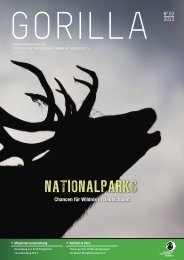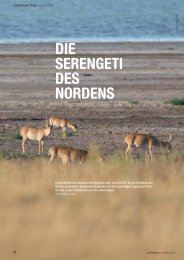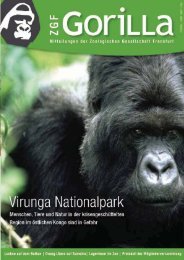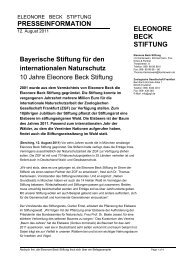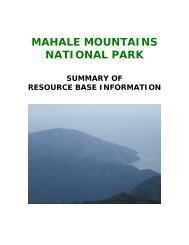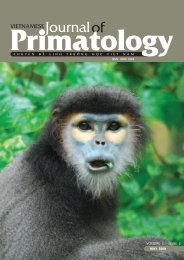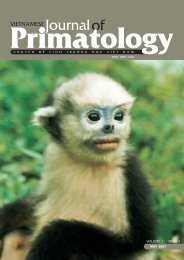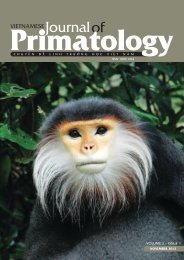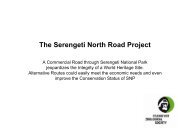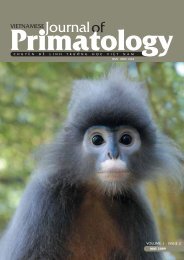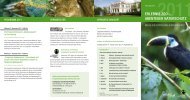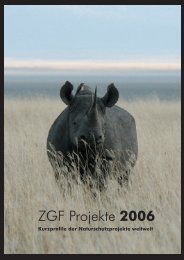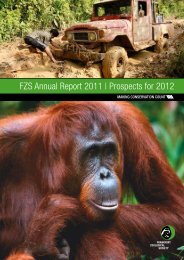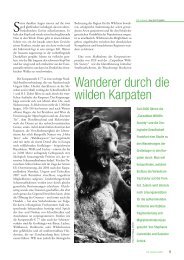Serengeti General Management Plan
Serengeti General Management Plan
Serengeti General Management Plan
- TAGS
- serengeti
- www.zgf.de
You also want an ePaper? Increase the reach of your titles
YUMPU automatically turns print PDFs into web optimized ePapers that Google loves.
Diversification of tourism will be achieved, in part, through the development of tourism sinks<br />
in the High and Low Use Zones. These sinks will be designated areas where visitors can get<br />
out of their vehicles to undertake a specific activity; such as a short guided walk on a designated<br />
trail, viewing a cultural site, or lunch at a picnic site or water-bird viewing point. Overnight<br />
walking safaris will be piloted in the Wilderness Zone, and a walking safari scheme<br />
will be elaborated by TANAPA, TATO and the SENAPA Resource Protection Department<br />
during the first year of GMP implementation.<br />
Another key strategy to achieving a world class and environmentally responsible tourism experience<br />
in the <strong>Serengeti</strong> will be to upgrade and expand the existing SENAPA visitor facilities.<br />
These improvements will be done in close consultation with the tourism industry,<br />
with priorities being to upgrade water supply and sanitation throughout the Park and to provide<br />
accommodation appropriate to the needs and budget of local visitors, an important step<br />
in encouraging more Tanzanians to visit the <strong>Serengeti</strong>.<br />
The final focus of the Programme will be to update of SENAPA information services and administration<br />
support systems to ensure an informative and safe visit is enjoyed by all. An expanded<br />
and enhanced network of visitor interpretation facilities will be developed, including<br />
new visitor centres in strategic locations of the Park, mini-interpretation sites at selected tourism<br />
sinks, and up-to-date high quality SENAPA interpretation materials for sale and distribution.<br />
In accordance with TANAPA system-wide practices, administrative systems will be fully<br />
computerised on a wide area network with e-payment facilities at Park entrances. In addition,<br />
a new Special Campsite booking system will be piloted; aimed at ensuring high environmental<br />
standards are maintained and preventing unscrupulous tour operators block booking<br />
sites for occasional use. The new system will limit bookings at a specific campsite to a<br />
maximum of four consecutive weeks. In addition, a new category of Premium Campsites will<br />
be piloted during the GMP, which will consist of a few carefully selected sites in the High and<br />
Low Use Zones that may be booked for a season.<br />
3. Community Outreach Programme<br />
The Community Outreach Programme aims to elicit the support and collaboration of the<br />
communities surrounding SENAPA in safeguarding the integrity of SENAPA’s resource values.<br />
Proposed activities to achieve this will include scaling-up the conservation education<br />
programme to all park-adjacent districts, and improving park-community communication and<br />
cooperation.<br />
The major focus of this Programme will be to re-invigorate the Support to Community Initiated<br />
Projects (SCIP) scheme. This will involve revising the SCIP planning process to ensure<br />
that all current and future SCIP projects address both community development needs (especially<br />
of marginalised groups) and ecosystem conservation priorities. Two key areas for future<br />
support are prioritised: firstly, the identification and establishment of conservationfriendly<br />
income generating activities and secondly, the mitigation of human-wildlife conflicts.<br />
Linked to this will be the provision of support for community-based national resource management<br />
in the SENAPA buffer areas.<br />
4. Park Operations Programme<br />
The Park Operations Programme aims to enhance the efficiency and effectiveness of<br />
SENAPA park operations, such that SENAPA becomes a role model nationally and internationally.<br />
The GMP problem analysis identified poaching as the priority management issue to<br />
be addressed by this Programme. In response, SENAPA management will investigate and<br />
pilot new anti-poaching techniques; re-equip the Protection Department with the necessary<br />
modern equipment; build ranger-local community cooperation and anti-poaching reward<br />
schemes; and provide training to Village Game Scouts to protect conservation areas in the<br />
SENAPA buffer areas.<br />
vii



